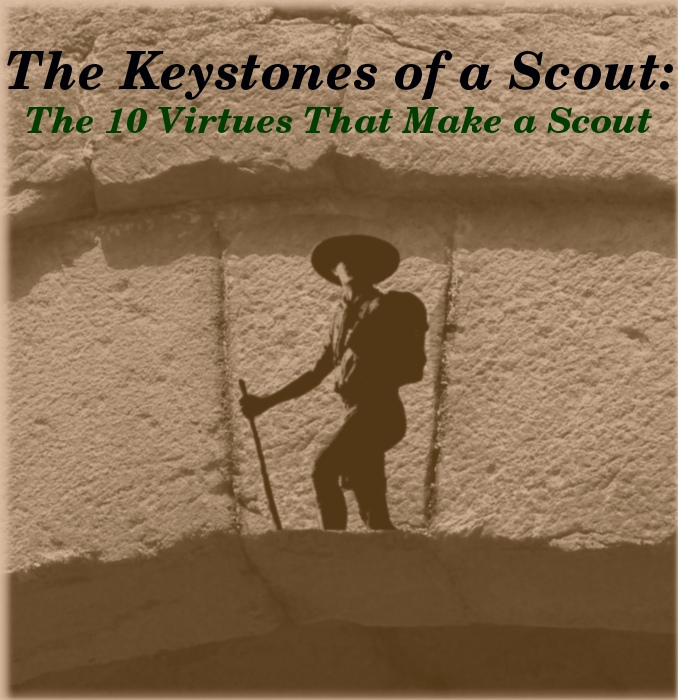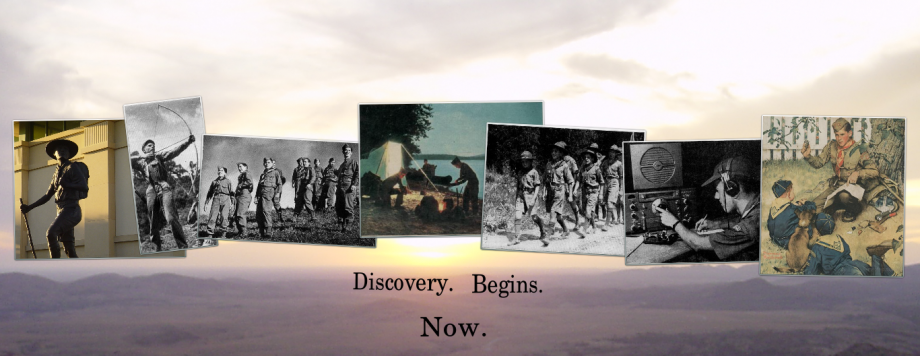
The name and fame of Jack Cornwell are known to every boy in Britain as the lad who in the great sea-fight off Jutland in 1916 stuck to his gun aboard the Chester when all the gun’s crew were killed or wounded and he might have got away under cover.
He was badly wounded himself – but in the responsible work of sight-setter his duty was to be at his post by the gun, and there he stayed for twenty minutes under heavy fire, in case he should be wanted.
At the end of the fight, after the Chester had come successfully through her tremendous contest with three German cruisers, the only unwounded man of the gun’s crew said to him, “Well done, lad. You stuck it out well. Lucky you weren’t wounded”.
“Well! I am wounded—here in the chest. But did we win?”
“Yes, my lad.”
The boy sank down fainting. He lingered a few days in a hospital and died of his wound, but satisfied – knowing that he had done his duty. He had “stuck to it”, as every Scout should.

This is Jack Cornwell, one of the youngest people to ever receive the Victoria Cross, the highest British award for gallantry in the face of the enemy. He was sixteen years old when he died for his country.
The quote printed above is from Scouting for Boys, by Robert Baden-Powell, the founder of the Scouting Movement. Yesterday, we opened up a new series on the 10 Keystones of a Scout. These are the ten character traits that make a Scout really a Scout. Yesterday we talked about Endurance, how Endurance and perseverance is necessary for a Scout to do what Scouts do.
Today, I’m going to discuss the next Keystone of a Scout: Self-Discipline. Throughout Scouting’s history, Self-Discipline has always been emphasized as being necessary to the character of a Scout. In fact, the quote above is from a chapter in Baden-Powell’s book entitled ‘Self-Discipline’.
So what is Self-Discipline? Why did I choose it to be a Scout Keystone? How does one get it? These are the questions I hope to answer in this post.
The Definition of Self-Discipline
In his chapter on Self-Discipline, Baden-Powell defines it by listing a series of character traits that result from Self-Discipline. Self-Discipline in a nutshell is being in complete control over oneself.
As you know, the first Law of a Scout is that a Scout is Trustworthy. In order for you to be trustworthy, you must be able to keep your cool and not lose your head in a difficult situation. This is part of Self-Discipline. You can tell when someone does not have self-discipline if they get angry over small things and are easily irritated.
That’s why we have the Scout Law: a Scout is cheerful. If you are cheerful even under difficult circumstances, then it is evident that you have acquired mastery over your own disposition. This is an import first step in self-discipline.
There are several other attributes of a self-disciplined Scout that Baden-Powell mentions. Among these are: Obedience, Duty, Loyalty, Honesty, Humility, and Courage. A lack of these things shows that a person has a lack of self-control, and therefore cannot be trusted.

A Scout must have Self-Discipline to be able to work with his fellow Scouts in accomplishing an objective.
What Makes Self-Discipline a Scout Keystone?
I chose Self-Discipline as one of the Scout Keystones for many reasons, some of which I alluded to above. In order to keep the Scout Law, a Scout must have Self-Discipline. A Scout cannot be Trustworthy, Loyal, or any of the twelve points if he hasn’t mastered control of himself.
If a Scout can’t concentrate when he has to, he won’t be able to learn the skills he needs to be a Scout. If a Scout can’t keep his own thoughts quiet and pay attention to others, then he won’t be able be mentored by anyone else. A Scout must have control over his own mind and body.
Most importantly, the core of what a Scout stands for is service to others. A Self-Disciplined Scout is able to put aside his own personal desires for others. True service does something for others without expecting anything in return. This is Self-Discipline at it’s finest. This is Scouting.
How to Cultivate Self-Discipline in Your Everyday Life
There are many different ways you can improve your self-discipline. The most important way is by practicing it in the little things throughout your day.
Take eating, for instance. So much of what most of us eat is simply for our pleasure, not to actually nourish us. Do you really need that extra coke? … or candy bar? Practice putting aside your cravings, this will not only improve your self-discipline, but also make you healthier too!
Also, practice what you say. Do you argue with your siblings? Or if you’re an only child, do you argue with your parents? So many disagreements that you have with your family members could be avoided if you did not retaliate with your words. Perhaps you feel that someone treated you unfairly, well is it really worth fighting about?
If you were to record everything you said and play it back at the end of the day, you probably would be surprised at everything you said. Practice thinking through what you’re going to say before you say it. This will help improve your self-discipline, and thereby help you become a better Scout.
Conclusion
In summary, Self-discipline is a very important aspect of being a Scout, and one we all need to work on. Start working on self-discipline in the little things throughout your day, this will build your self-discipline and raise your trustworthiness in the eyes of others. Then, when difficult times come, you will be ready to face them like a true Scout.
Thanks for reading this post. Do you have any comments, thoughts, or questions? I’d love to hear them!
I want this to get out to as many Scouts as possible, so please help by sharing this post. You can easily share this on Facebook, Twitter, and etc. by clicking the little icons below this post.
If you don’t want to miss the rest of the installments of this series, just put your email in the little box to the right on the home page, and you will automatically get an email each time a new post is published.
Thanks again! Scout on, my friends!
















